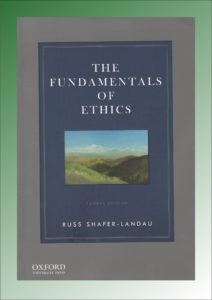RSL Surveys and Argues Ethics, Part 1
 Russ Shafer-Landau. 2018. The Fundamentals of Ethics. New York: Oxford University Press.
Russ Shafer-Landau. 2018. The Fundamentals of Ethics. New York: Oxford University Press.
Review by Stephen W. Hiemstra
How things get done has always been interesting to me. As a kid, when we traveled and spotted an interesting manufacturing plant along the highway, my dad would stop and we would inquire as to whether they offered plant tours. During my dissertation work I must have visited a dozen or more meat packing plants from Detroit to. Most people don’t know it, but economics (my first career) is a field closely related to ethics, its cousin in the philosophy department.
Introduction
In his book, The Fundamentals of Ethics, Russ Shafer-Landau (hereafter RSL) writes:
“In the pages to come, I present and evaluate a lot of arguments. These are the ones at the heart of morality, the ones that try to offer answers to the deepest questions of ethics. As we will see, no fundamental theory—about the good life, our moral duties, or the status of morality—has earned anything like unanimous support among philosophers.”(17-18)
While this might seem like the failure of philosophy, knowing the basic arguments and counterarguments is extremely useful. Think about how zoologists classify animals allows the zoologist to recognize species and subspecies almost immediately. In the same way, knowing the key questions in philosophy and the arguments pro and con for those questions allows one to quickly survey an entire field of inquiry because the same questions and arguments have floated around since antiquity, albeit in different contexts.
Background
RSL teaches in the Department of Philosophy at the University of Wisconsin in Madison. He is a graduate of Brown University and received his doctorate at the University of Arizona. He is the founder and editor of the periodical Oxford Studies in Metaethics and the author of numerous books.
Organization
RSL writes this textbook in twenty-one chapters divided into three parts, preceded by a preface and introduction and followed by references, suggestions for further reading, glossary, and index. The chapters are:
“Introduction
Part One: The Good Life
Hedonism: Its Powerful Appeal
Is Happiness All that Matters?
Getting What You Want
Problems for the Desire Theory
Part Two: Normative Ethics: Doing the Right Thing
Morality and Religion
Natural Law
Psychological Egoism
Ethical Egoism
Consequentialism: Its Nature
Consequentialism: Its Difficulties
The Kantian Perspective: Fairness and Justice
The Kantian Perspective: Autonomy and Respect
The Social Contract Tradition: The Theory and Its Attractions
The Social Contract Tradition: Problems and Prospects
Ethical Pluralism and Absolute Moral Rules
Ethical Pluralism: Prima Facie Duties and Ethical Particularism
Virtue Ethics
Feminist Ethics
Part Three: Metaethics: The Status of Morality
Ethical Realism
Moral Nihilism
Eleven Arguments Against Moral Objectivity”(vii-xiv)
Part one focuses on what makes a good life or what RSL refers to as value theory. In part two he talks about normative ethics, who is in and out of our moral universe and the roles of virtue, self-interest, and justice. In part three, he discusses metaethics and the sources of moral authority (2). Clearly, RSL covers a lot of material in 342 pages plus front and back matter.
Beginnings
While skeptics argue that moral thinking is arbitrary, RSL lays out a list of parameters that guide any moral quest. These are not meant to be exhaustive:
“Neither the law nor tradition is immune from moral criticism…
Everyone is morally fallible…
Friendship is valuable…
We are not obligated to do the impossible…
Children bear less moral responsibility than adults…
Justices is a very important moral good…
Deliberately hurting other people requires justification…
Equals ought to be treated equally…
Self-interest isn’t the only ethical consideration…
Agony is bad…
Might doesn’t make right…
Free and informed requests prevent rights violations.”(6-7)
Poor beginnings can also be articulated. He writes: “A morality that celebrates genocide, torture, treachery, sadism, hostility, and slavery is…either no morality at all or a deeply failed one.”(7) Because we can all name cultures that embrace such practices, clearly not all cultures are created equal.
What is morality? RSL sees no widely agreed upon definition. (8) What is moral reasoning? RSL sees a set of reasons (premises) and a conclusion that they support. (9) The validity of an argument depends on how well the premises of an argument support its conclusion. (12)
Assessment
In part one of this review, I have outlined the basic arguments that RSL present. In parts two and three, I will examine some of his more important arguments.
In this textbook,The Fundamentals of Ethics, Russ Shafer-Landau offers a taxonomy of ethical arguments covering a wide range of ethical philosophies. His writing is clear, concise, and interesting in the topics used as examples.
Footnotes
http://philosophy.wisc.edu/people.
https://en.wikipedia.org/wiki/Russ_Shafer-Landau. https://www.amazon.com/Russ-Shafer-La....
RSL Surveys and Argues Ethics, Part 1
Also see:
Books, Films, and Ministry
Other ways to engage online:
Author site: http://www.StephenWHiemstra.net, Publisher site: http://www.T2Pneuma.com.
Newsletter:http://bit.ly/Give_Thanks_2018
The post RSL Surveys and Argues Ethics, Part 1 appeared first on T2Pneuma.net.



